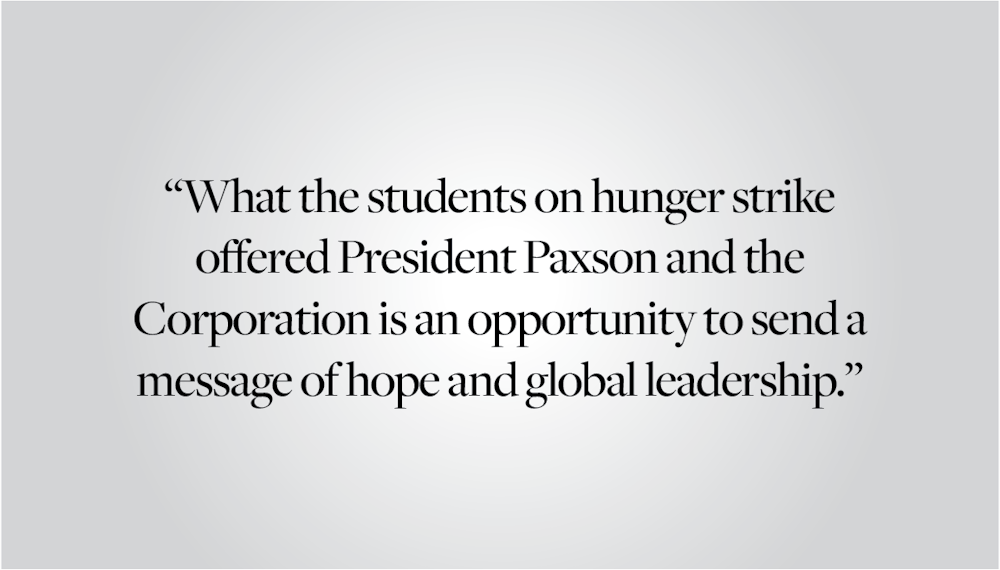Throughout its more than 250-year history, the Brown community has consistently stood up for ethical causes, sending a message to the nation and to the world at moments when others remained silent. Generation after generation, the leaders of our university have understood that Brown does not exist in a vacuum — instead, it is part of a public sphere that is as large and expanding as the creative horizons of those who make this vibrant, diverse and critically engaged community on College Hill. Taking seriously its mandate as a socially responsible institution is part of Brown’s identity. Unfortunately, the current administration’s response to the ongoing genocide in Gaza has been falling short of this historical legacy. Since the very beginning of the recent protest, it became clear that the pathway adopted by the administration was one of stalling. The administration has used all the available bureaucratic excuses to avoid engaging in genuine dialogue. While the public might be used to this kind of behavior these days, it is disappointing, coming from the president of Brown University. This is not the kind of vigorous, open, critical and transformative public debate that our institution has historically promoted.
Only rarely in human history has it become as clear as it is today that appalling crimes against humanity are taking place before our eyes. Never before has worldwide consensus grown so quickly that we are witnessing a Palestinian genocide; the near future will look back and see this as incontrovertible. As independent international organizations release daily numbers of lives taken by bombs, starvation and disease, and as journalists — who are documenting these conditions — face a record number of their killings, we risk becoming desensitized to the suffering of our fellow humans in Gaza. Most of them are children. However, the price of indifference is untenable. Brown must be consistent with the public image it has been carefully shaping over the years and respond to what is happening.
The current climate in institutions of higher education (especially private elite schools) is one of anxiety, understandably. The last thing a university leader wants right now is public attention. The message issued by President Christina Paxson P’19 P’MD’20 on Friday, offering nothing but an administrative excuse not to act, is symptomatic of such anxiety. But we should be especially wary of bureaucratic excuses in moments like this. History has shown us tragic examples of using bureaucratic procedure as an attempt to evade responsibility. Those who chose to take that way out were never able, however, to escape the scrutiny of the future.
Fear should not deter our president from doing what is right, and that is listening to the students' just demands. President Paxson certainly does not want to go down in history as the president who, during the genocide of 2023–24, remained frozen. Future generations will understand this moment as we understand the catastrophes of the past century. And they, too, will be as horrified as we are by the inaction of those who decided to look the other way in the past.
The hunger strike was not about the group of students who decided to take this action. As a faculty member at a public university in the American South, I understand that many Americans might not empathize with or even notice a group of Ivy League students on hunger strike. But neither the students’ relative privilege nor the limitations of their protest should distract us from the justice of their cause. This protest was about all of us, as members of the extended Brown community, and how we want to understand our roles in society. But it is also about the broader question of the entanglement between institutions of higher education and the military-industrial complex. It is impossible to justify, in light of the principles that guide Brown’s purported mission, that the University should invest in companies whose business contributes to the annihilation of human lives. As universities in Gaza are bombed into total destruction, it is hard to witness Brown offering no more than a vague response to the students' demands not to remain complicit.
For all these reasons, what the students on hunger strike offered President Paxson and the Corporation is an opportunity to send a message of hope and global leadership: to make a transformative commitment to the principles at the core of this community. This situation offers a rare clarity, both in the devastation taking place, and in what can be done to stop it. The students in Campus Center proved that they understood the ethos of Brown, and though the strike has ended and the Corporation did not address divestment in their recent meeting, there is still the opportunity for the administration to be consistent with the values that Brown proclaims. The leadership can and must meet the challenge of this moment. Brown must divest from genocide.
Pedro Lopes de Almeida PhD'21 can be reached at pedro_lopesdealmeida@alumni.brown.edu. Please send responses to this opinion to letters@browndailyherald.com and other op-eds to opinions@browndailyherald.com.




